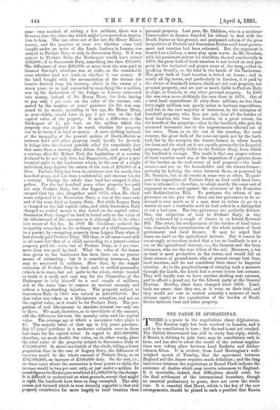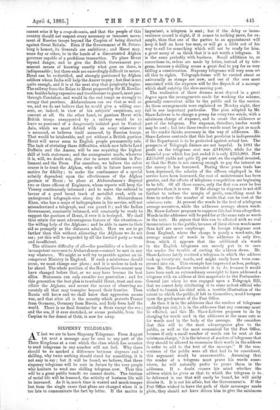THE PAUSE IN AFGHANISTAN.
THERE is a pause in the negotiations about Afghanistan. The Russian reply has been received in London, and is said to be conciliatory in tone ; but the endis not yet reached. The British Government has still to study that reply, which, if Russia is striving to gain time, may be conciliatory only in form, and has also to await the result of the serious negotiations now taking place between Lord Dufferin and Abdurrahman Khan. It is evident, from Lord Hartington's wellweighed speech of Tuesday, that the agreement between England and the Ameer requires much definition ; and the long interviews between the negotiators at Rawul Pindi indicate the existence of .doubte which may involve references to England. It is inevitable, indeed, that difficulties should exist, for the final settlement of the international boundary, though an essential preliminary to peace, does not cover the whole case. It is essential that Herat, which is the key of the new arrangements, should be placed in such a position that Russia cannot seize it by a coup-de-main, and that the people of this country should not suspect every necessary. or innocent movement of Russian troops beyond the Caspian of being directed against Great Britain. Even if the Government of St. Petersburg is honest, its Generals are ambitious ; and Herat may, some day or other, be in the hands of a discontented Afghan governor capable of a perfidious transaction. To place Herat beyond danger, and to give the British Government permanent means of knowing exactly what goes on there, is indispensable ; but those ends are exceedingly difficult to secure. Herat can be re-fortified, and strongly garrisoned by Afghan soldiers whom India will help the Ameer to pay ; but that is not quite enough, and it is at the next step that perplexity begins. The railway from the Bolan to Herat proposed by Sir H. Rawlinson, besides being expensive and troublesome to guard, must pass through Candahar, and would in the end tempt us strongly to occupy that province. Abdurrahman can see that as well as we, and we do not believe that he would give a willing consent, or, indeed, in view of his subjects' suspicions, any consent at all. On the other hand, to garrison Herat with British troops unsupported by a railway would be to leave us possessed of a dangerously isolated post in Central Asia, which we must defend with an army whenever it is menaced, or believes itself menaced, by Russian troops. That would be intolerable, and vet without a British garrison Herat will never seem to English people permanently safe. The task of obviating these difficulties, which now falls to Lord Dufferin and the Ameer, will be one requiring the highest skill of both statesmen ; and the arrangement made, whatever it is, will, we doubt not, give rise to severe criticism in Parliament and the Press. For ourselves, we believe the safest course is to trust the Afghan, who will in future have every motive for fidelity ; to make the continuance of a special subsidy dependent upon the effectiveness of the Afghan garrison of Herat ; to place at Abdurrahman's disposal two or-three officers of Engineers, whose reports will keep the Viceroy continuously informed ; and to waive the railroad in favour of a good broad track of metalled road, with an
underground telegraph-wire along its side. Abdurrahman Khan, who has a corps of heliographers in his service, will not misunderstand a telegraph, and can guard it ; and the Indian Government, constantly informed, will constantly be ready to support the garrison of Herat, if ever it is besieged. We shall
thus retain the most advantageous feature of the situation,—
the willing help of the Afghans ; and be able.to move to their aid as promptly as the distances admit. How we are to go farther than this without alienating the Afghans we do not see ; yet this will be regarded by all the forward party as weak and insufficient.
The ultimate difficulty of all—the possibility of a hostile or incompetent successor to Abdurrahman—cannot be met in any way whatever.. We might as well try to provide against an incompetent Ministry in England. If such a misfortune should occur, we must change our plans ; and it is useless to look so far ahead. The whole position of the Russian Government may have changed before that, or we may have become its best allies. Statesmen can only consider one generation ; and for this generation the best plan is to rebuild Herat, trust and conciliate the Afghans, and secure the means of observing accurately all that may transpire beyond their frontier. Then Russia will know and we shall know that aggression means war, and that after all is the security which protects France from Germany, Germany from Russia, and Italy from half the world. There is no final frontier for a State except the sea ; and the sea, if it ever stretched, as seems probable, from the Caspian to the desert of Gobi, is now far away.



































 Previous page
Previous page